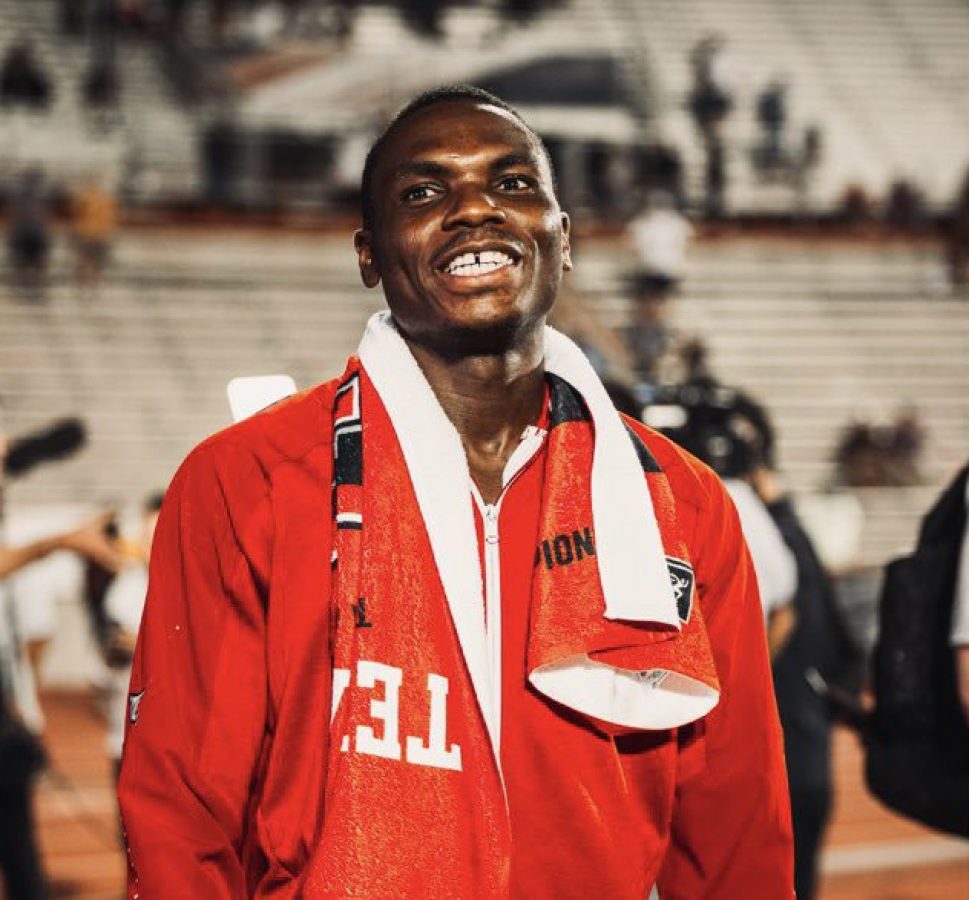Now’s the time for Divine Oduduru to go pro

Two personal bests at the NCAA Championships in Austin, Texas, have placed Divine Oduduru on the world stage as one of the top athletes to watch ahead of the World Championships in Doha. Winning the sprint double in world leading times means that the 22-year-old Delta State native is no longer a hidden gem but a name that is recognized globally. The young man took the 100m title in 9.86s and the 200m in 19.73s. After his wild-eyed viral interviews of 2013 left many in stitches, Oduduru is now allowing his feet to speak for him.
The Texas Tech University junior has come to a point where he needs to decide whether to continue with his NCAA scholarship that restricts his ability to earn money from commercial deals or jettison the contract to go into the world of professional sports. That is where the big bucks are. He will not be the first major college athlete to abandon amateur sports. Andre de Grasse, the Canadian sprinter who won two medals at the 2016 Olympic Games in Rio de Janeiro, dumped his University of Southern California (USC) scholarship in 2015 and picked up a Puma contract worth $11million. De Grasse announced his move as soon as he won the sprint double at the NCAA Championship of that year.
On Wednesday, June 12, Louisiana State University athlete, Sha’Carri Richardson announced her decision to go pro via social media that was praised by LSU alumnus and basketball great, Shaquille O’Neal. The 19-year-old had last week run 10.77s at the NCAA’s Women’s 100m final to become the world leader this year and the fastest U20 female in history. Just after one year of university, she is going into the world of professional athletics in order to earn money.
According to the strict rules of the NCAA, the governing body for sports in the United States collegiate system, student-athletes who are on scholarship are not allowed to receive payment apart from daily upkeep and accommodation fees. The rules state that “a student-athlete or prospective student-athlete may accept prize money as long as the amount of the prize is less than or equal to his or her expenses for participating in the competition, such as meals or lodging. The prize money may not pay for the expenses of parents or coaches.” Athletes found wanting are liable to lose their hard earned scholarships. It was the reason why Courtney Dike refused to accept the bonus from the Nigeria Football Federation in 2015 after the FIFA U20 Women’s World Cup where the Falconets finished as runners-up.
For many young scholar-athletes, the allure of professional sports is too potent to ignore so they quit the collegiate circles and head out for the big money. They know that their careers could be ended by injuries that would leave them without money. They have bills to pay and families to care for. So they take the plunge. It does not always end in glory. Students who aim for pro basketball careers have to face the reality of not being drafted into the NBA where just around 60 players make it annually. Being unable to return to their scholarships, they have to work from the bottom of the pile or proceed to play in smaller European leagues.
For Oduduru, he will know that he cannot be at the peak of the sport forever and now is the time to make that big decision. In an interview with the IAAF website this month, Oduduru talked about how he knew that his talent was always going to lift him out of the poverty that he grew up with in Ovworo where he was the 10th child of his parents. Having recently lost his father and a brother, Oduduru has his mother left to care for as well as his other siblings. It is a decision that will definitely be swayed by their thoughts.
On Tuesday, his coach dropped the biggest hint yet that Oduduru could be set for a major announcement. Speaking to the Lubbock Avalanche-Journal, Wes Kitley said: “I’m going to encourage him to [go pro]. He’d turn down too much money. He can tweak his hamstring next year and get nothing. How are you going to turn down $350,000 for five years or $400,000 for five years or $500,000 for five years — two and a half million dollars? You can’t do it. Not in our world. Not in the track world. I mean, that’s a lot. He’s a sprinter, so he has an opportunity to get some of that bigger money.” It is advice worth listening to.
It is a decision that Oduduru must make this summer. He cannot afford to remain an amateur. He needs to get a good agent that will negotiate a proper deal with one of the major apparel brands. The support he gets from the brand will help prepare him for the 2020 Olympics. He will be able to make enough money to turn his and his family’s life around. After all, what is the essence of professional sport if not to make otherwise distant dreams come true?
(GAURDIANNEWSPAPER)






